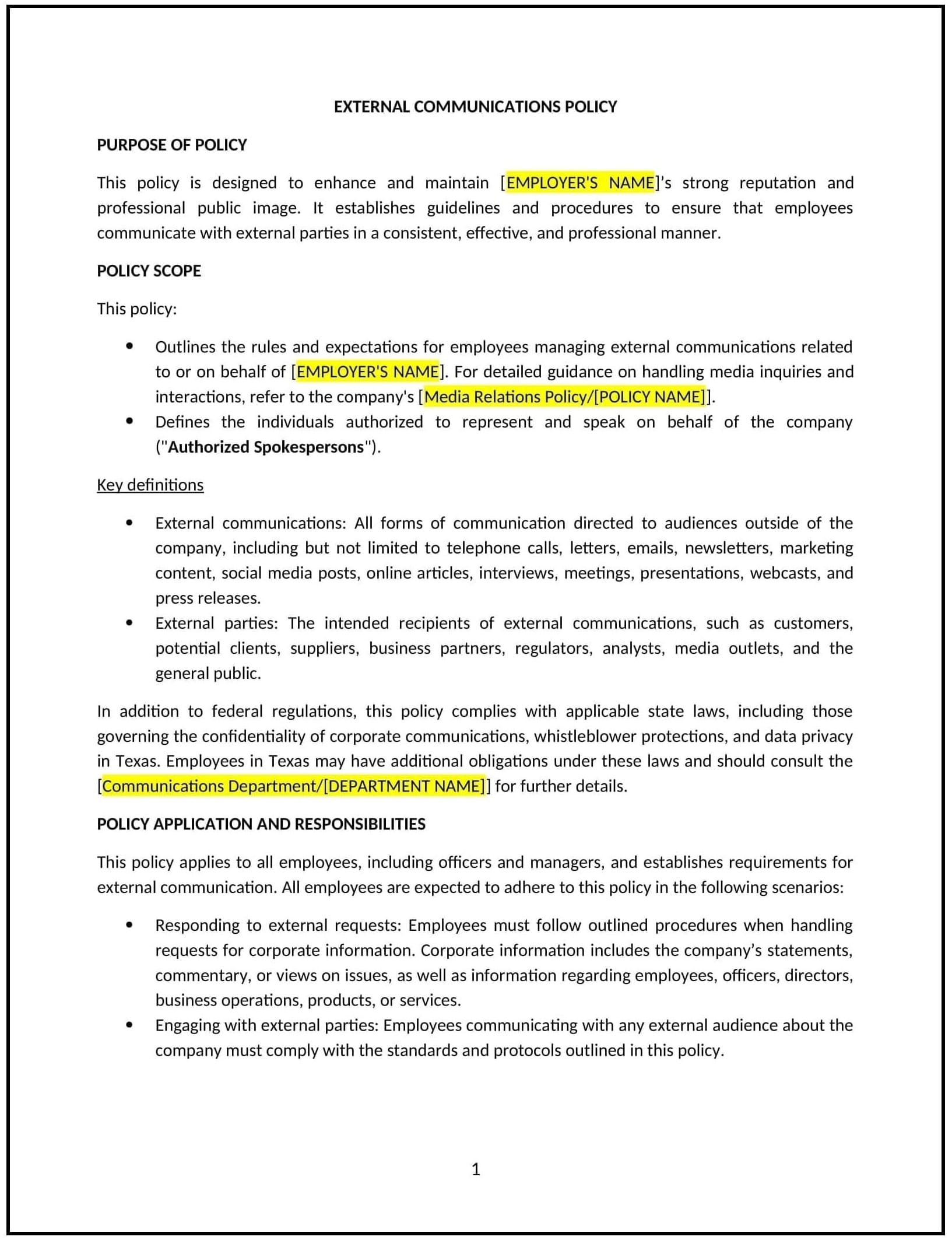External communications policy (Texas): Free template
Got contracts to review? While you're here for policies, let Cobrief make contract review effortless—start your free review now.

Customize this template for free
External communications policy (Texas)
This external communications policy is designed to help Texas businesses establish clear guidelines for communicating with individuals and entities outside the company, including customers, vendors, the media, and the public. The policy ensures that all external communications are consistent, professional, and aligned with the company's values and goals while maintaining compliance with applicable Texas state laws and federal regulations.
By adopting this policy, businesses can promote a unified brand message, protect sensitive information, and build positive relationships with external stakeholders.
How to use this external communications policy (Texas)
- Define who is authorized to communicate externally: Clearly specify which employees or departments are authorized to make public statements or communicate with external parties, such as the media, government agencies, or clients.
- Set guidelines for communication channels: Outline the acceptable channels for external communication, such as email, phone calls, social media, press releases, or public events. Define which channels are appropriate for specific types of communication and provide instructions for using each platform.
- Address confidentiality and privacy: Establish guidelines for protecting confidential and sensitive information when communicating externally. Specify what information can be shared with the public and what must remain confidential, such as proprietary business data, customer information, or ongoing business strategies.
- Promote consistent messaging: Ensure that all external communications are consistent with the company’s brand values, messaging, and tone. Provide key messaging guidelines to help employees craft clear, effective, and aligned communications.
- Monitor and evaluate communications: Set expectations for monitoring external communications to ensure that they align with company standards. This may include reviewing email correspondence, social media posts, and press interactions.
- Set consequences for violations: Clearly outline the consequences for failing to comply with the external communications policy, including potential disciplinary actions, up to and including termination, for violations that negatively affect the company’s reputation or legal standing.
Benefits of using this external communications policy (Texas)
This policy offers several benefits for Texas businesses:
- Maintains consistent brand messaging: A clear policy ensures that all external communications reflect the company’s values and messaging, preventing conflicting or misrepresented information from being shared.
- Protects company reputation: By controlling how employees communicate with external parties, the business can prevent potential miscommunication, misinformation, or actions that could damage the company’s public image.
- Reduces legal risks: Properly managing external communications helps mitigate the risk of legal challenges, regulatory violations, or breach of confidentiality, particularly when dealing with customers or the media.
- Promotes professionalism: Employees understand the importance of maintaining a professional tone and demeanor in all external communications, which enhances the company’s image and relationships with stakeholders.
- Supports legal compliance: The policy helps businesses comply with Texas state laws and federal regulations regarding communication with external parties, including data protection, advertising standards, and industry-specific regulations.
Tips for using this external communications policy (Texas)
- Communicate the policy clearly: Ensure that all employees are aware of the external communications policy, including the rules for communicating with clients, the media, and other external entities.
- Provide training: Offer training on how to communicate with external parties professionally and in alignment with the company’s values and standards. This should include crisis communication and handling sensitive issues.
- Monitor public communications: Regularly monitor the company’s social media, website, and other external communications channels to ensure compliance with the policy and address any potential miscommunication or issues promptly.
- Establish a spokesperson: Designate a primary spokesperson or communication team responsible for handling media inquiries and public statements to ensure consistency in messaging.
- Review regularly: Update the policy as necessary to reflect changes in Texas state laws, federal regulations, or company practices related to external communications.